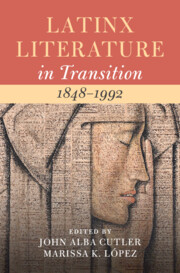Book contents
- Latinx Literature in Transition, 1848–1992
- Latinx literature in transition
- Latinx Literature in Transition, 1848–1992
- Copyright page
- Dedication
- Contents
- Figures
- Contributors
- Acknowledgments
- Introduction
- Part I Space
- Part II Being
- Part III Time
- Chapter 9 Death at and Afterlives of the Silver Dollar Café in Chicanx Cultural Production
- Chapter 10 Passing Time
- Chapter 11 Romancing Latinidad
- Chapter 12 Singing Apocalypse
- Part IV Form
- Part V Labor
- Bibliography
- Index
- References
Chapter 12 - Singing Apocalypse
On Corridos, Catastrophe, and the Poetics of Reconstitution
from Part III - Time
Published online by Cambridge University Press: 10 April 2025
- Latinx Literature in Transition, 1848–1992
- Latinx literature in transition
- Latinx Literature in Transition, 1848–1992
- Copyright page
- Dedication
- Contents
- Figures
- Contributors
- Acknowledgments
- Introduction
- Part I Space
- Part II Being
- Part III Time
- Chapter 9 Death at and Afterlives of the Silver Dollar Café in Chicanx Cultural Production
- Chapter 10 Passing Time
- Chapter 11 Romancing Latinidad
- Chapter 12 Singing Apocalypse
- Part IV Form
- Part V Labor
- Bibliography
- Index
- References
Summary
On September 19, 1967, Hurricane Beulah devastated the borderlands of South Texas and Northern Mexico. Tearing across the flat terrain, flooding the Rio Grande/Bravo delta, causing nearly $240 million in property damage, and affecting thousands of residents on both sides of the border, the hurricane was nothing short of a minor apocalypse. In the half-century since it hammered the Gulf coastline, the storm has become a recurring motif in the border region’s long cultural memory, returning to conversation often by way of old photographs, grainy video footage, archived news articles, and unsettling historical analogies. Here, though, I emphasize figurations besides the visual and traditionally textual: the local soundtracks that the storm produced, the narrative folk ballads, or corridos, that it inspired. What might such post-apocalyptic ballads teach us today, amid the immense and interconnected social and ecological difficulties of the present? Uniting literary study with ethnomusicological inquiry, in this chapter I reflect on examples of such corridos to argue for the border ballad’s capacities to unsettle the colonialities of genre, media, and discipline; to bear witness to local catastrophe; and, ultimately, to guide collective memory in the long shadow of colonial encounter.
Keywords
- Type
- Chapter
- Information
- Latinx Literature in Transition, 1848–1992 , pp. 210 - 224Publisher: Cambridge University PressPrint publication year: 2025

